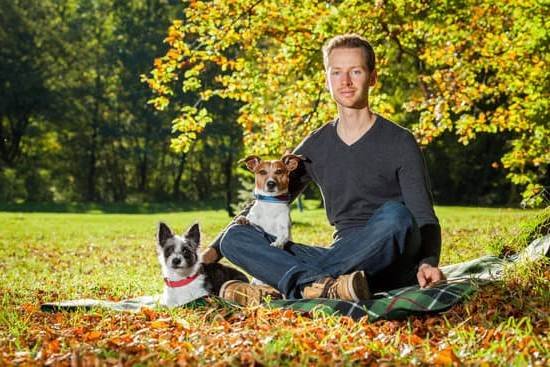Are you looking for a reliable guide on how to find a positive dog trainer? Positive dog training has gained popularity in recent years for its effective and humane approach to shaping a dog’s behavior. By focusing on rewarding good behavior rather than punishing bad behavior, positive dog training not only helps in creating a strong bond between you and your furry friend but also ensures long-lasting results.
Positive reinforcement is a key aspect of positive dog training, where dogs are rewarded for exhibiting desired behaviors. This method is rooted in the science of animal behavior and has been proven to be highly effective in training dogs. By understanding the principles behind positive reinforcement, you can work with a positive dog trainer who implements these techniques and achieves successful outcomes.
When looking for a positive dog trainer, it is important to consider their qualifications and experience. A reputable trainer should have certifications from recognized organizations and practical experience working with different breeds and temperaments. By choosing a qualified trainer who uses positive reinforcement methods like clicker training or lure-reward training, you can ensure that your furry friend receives the best care and guidance in their training journey.
What to Look for in a Positive Dog Trainer
When looking for a positive dog trainer, it is crucial to ensure that they have the right qualifications and experience in the field of canine behavior and training. A certified dog trainer with relevant credentials can provide you with the assurance that they have undergone proper training themselves and have the knowledge and skills necessary to work effectively with your furry companion.
One way to verify a trainer’s qualifications is by checking if they are certified by reputable organizations such as the Certification Council for Professional Dog Trainers (CCPDT) or the Association of Professional Dog Trainers (APDT).
Experience is another key factor to consider when choosing a positive dog trainer. An experienced trainer will have encountered a wide range of behavioral issues in dogs and will know how to address them effectively using positive reinforcement techniques. Look for trainers who have a proven track record of success working with dogs of different breeds, ages, and temperaments. They should also be able to provide you with references from satisfied clients who can vouch for their expertise and professionalism.
Continuing Education and Specializations
In addition to qualifications and experience, it is important to consider whether a dog trainer engages in continuing education and has any specialized training or certifications in specific areas such as aggression management, puppy training, or therapy dog preparation. Continuing education shows that the trainer is committed to staying current on the latest research and techniques in dog training, which can ultimately benefit you and your pup.
Specializations indicate that the trainer has focused expertise in certain areas, making them more equipped to handle unique challenges your dog may face.
Personalized Approach
When selecting a positive dog trainer, look for someone who takes a personalized approach to training that considers your dog’s individual needs, personality, and learning style. A good trainer will tailor their methods to suit your dog’s specific requirements rather than using a one-size-fits-all approach.
They should also involve you in the training process so that you can learn how to reinforce positive behaviors effectively even after the sessions are over. Be wary of trainers who offer quick fixes or guarantee instant results without taking into account your pet’s well-being and long-term behavior modification needs.
How Positive Reinforcement Works
Positive reinforcement is a fundamental aspect of positive dog training that operates on the principle that rewarding desired behaviors increases the likelihood of those behaviors being repeated in the future. This method relies on the use of rewards such as treats, toys, or verbal praise to encourage and reinforce good behavior in dogs. By focusing on positive reinforcement, trainers can create a strong bond with their canine companions based on trust and mutual respect.
One of the key elements behind how positive reinforcement works is the concept of operant conditioning, which was developed by behaviorist B.F. Skinner. In this framework, dogs learn to associate specific actions with consequences – receiving a reward for performing a desired behavior and facing no consequence for not engaging in undesirable behaviors. This results in dogs actively choosing to exhibit preferred behaviors as they understand that doing so leads to positive outcomes.
Research has shown that using positive reinforcement in dog training not only improves obedience and responsiveness but also enhances the overall well-being and mental health of the dog. By focusing on reinforcing wanted behaviors rather than punishing unwanted ones, positive trainers create a safe and supportive learning environment for dogs to thrive in. Understanding the science behind how positive reinforcement works can help dog owners make an informed decision when choosing a trainer who utilizes these effective training methods.
| Benefits of Positive Reinforcement Training | How It Works |
|---|---|
| Improves obedience and responsiveness | By rewarding desired behaviors |
| Enhances overall well-being and mental health | Through creating a safe learning environment |
Different Training Techniques
Positive dog training encompasses a variety of techniques that focus on rewarding good behavior rather than punishing bad behavior. Utilizing positive reinforcement methods can help strengthen the bond between you and your furry friend while promoting a happy and healthy relationship. Here are some popular training techniques that positive dog trainers often use:
- Clicker Training: Clicker training involves using a small device that makes a clicking sound to mark the exact moment your dog performs the desired behavior. This method helps dogs quickly associate the behavior with a reward, making it an effective training tool.
- Lure-Reward Training: Lure-reward training involves using treats or toys as incentives to motivate your dog to perform specific actions. By guiding your dog’s movements with a lure, you can reinforce positive behaviors and encourage learning through positive reinforcement.
- Positive Association: Positive association training focuses on creating positive experiences for your dog by pairing desired behaviors with rewards or praise. This technique helps build trust and confidence in your dog while reinforcing good behavior.
Understanding these different training techniques can help you find a positive dog trainer who utilizes methods that align with your goals and values as a pet owner. By choosing a trainer who specializes in positive reinforcement, you can create a harmonious environment for both you and your canine companion.
When looking for a positive dog trainer, it is important to inquire about their approach to training and how they incorporate positive reinforcement techniques into their sessions. Additionally, observing a trainer in action or asking for references from previous clients can give you valuable insights into their training style and effectiveness. By taking the time to research and ask questions, you can ensure that you are making an informed decision when selecting the right trainer for your furry friend.
Remember, finding a positive dog trainer is not just about teaching basic commands; it is also about building trust, communication, and mutual respect between you and your canine companion. A skilled trainer who uses positive reinforcement methods can help address behavioral issues, enhance obedience skills, and ultimately strengthen the bond between you and your furry friend. Invest in proper research and ask relevant questions to find the perfect fit for both you and your beloved pet.
Red Flags to Watch Out for When Choosing a Dog Trainer
When looking for a positive dog trainer, it’s crucial to be aware of red flags that may indicate a less than ideal trainer. These warning signs can help you avoid trainers who may not use positive reinforcement methods or have the necessary qualifications and experience to effectively train your furry friend.
Lack of Positive Reinforcement Techniques
One major red flag to watch out for is a dog trainer who relies heavily on punishment-based techniques rather than positive reinforcement. Positive reinforcement focuses on rewarding desired behaviors, encouraging them to be repeated, while punishment-based methods can create fear and anxiety in your pet. It is essential to ensure that the trainer you choose uses gentle and effective positive training methods.
Disregard for Canine Behavior Science
Another red flag is a dog trainer who dismisses the importance of understanding canine behavior science. A knowledgeable and skilled trainer should have a solid understanding of how dogs learn and behave, as well as the ability to apply this knowledge in training sessions. If a trainer lacks knowledge of behavioral science or promotes outdated training methods, it may be best to look for another professional.
Unwillingness to Provide References or Demonstrations
If a dog trainer is hesitant or unwilling to provide references from satisfied clients or demonstrations of their training techniques, consider it a red flag. Reputable trainers should be proud to showcase their skills and accomplishments through client testimonials or live demonstrations. Asking for references and observing the trainer in action can give you valuable insight into whether they are the right fit for you and your dog.
By being aware of these red flags when choosing a dog trainer, you can ensure that you find a positive reinforcement-based professional who will provide effective and compassionate training for your canine companion. Remember that your furry friend deserves the best care and guidance possible when it comes to training, so take the time to research and interview potential trainers thoroughly before making your decision.
Finding a Positive Dog Trainer Near You
Another useful resource for finding a positive dog trainer is through online platforms such as websites dedicated to listing certified trainers in your area. These websites often include reviews and ratings from previous clients, giving you a better idea of the trainer’s reputation and success rate. Additionally, professional organizations like the Association of Professional Dog Trainers (APDT) or Certification Council for Professional Dog Trainers (CCPDT) can provide lists of accredited trainers in your region.
When researching potential dog trainers, be sure to consider their location and availability. Finding a trainer who is easily accessible and able to work with your schedule is crucial for consistency in training sessions.
It’s also important to evaluate the trainer’s experience and credentials, ensuring they have the necessary qualifications to meet your dog’s specific needs. By taking the time to research and ask the right questions, you can find a positive dog trainer who will help you build a strong bond with your canine companion through effective training techniques.
Questions to Ask When Interviewing Potential Dog Trainers
When looking for a positive dog trainer, it is essential to ask the right questions during the interviewing process to ensure that you find the best fit for your furry friend. One of the most crucial questions to ask is regarding their training methods.
Make sure to inquire about how they implement positive reinforcement in their training sessions and what techniques they use to encourage good behavior in dogs. Understanding their approach will give you insight into whether their methods align with your goals for your pet.
Another important question to consider asking potential dog trainers is about their experience and credentials. Inquire about their background in dog training, any certifications they hold, and if they have worked with dogs similar to yours before.
A reputable and qualified dog trainer should be able to provide references or examples of successful cases they have worked on in the past. This information will help you gauge their level of expertise and determine if they are the right fit for your dog’s needs.
Lastly, don’t forget to ask about their availability, pricing, and training schedule. Understanding these practical aspects will be crucial in making a decision that fits both your budget and time constraints.
Additionally, make sure to clarify any specific requirements or goals you have for your dog’s training and see if the trainer can accommodate them. By asking these questions during the interview process, you can gather all necessary information to make an informed decision on selecting the best positive dog trainer for your beloved pet.
| Questions | Importance |
|---|---|
| Training Methods | Understand approach |
| Experience & Credentials | Determine expertise |
| Availability & Pricing | Practical considerations |
The Benefits of Positive Dog Training for Both You and Your Furry Friend
Positive dog training is not just beneficial for your furry friend, but also for you as a pet owner. One of the main advantages of positive reinforcement training is that it fosters a strong bond between you and your dog based on trust and mutual respect. By using rewards such as treats, toys, or praise to reinforce good behavior, you are creating a positive association with learning and obedience for your canine companion.
Another benefit of positive dog training is that it helps to build your dog’s confidence and self-esteem. When your furry friend successfully follows a command and receives a reward, they feel a sense of accomplishment which boosts their confidence. This can lead to better behavior overall, as confident dogs are more likely to respond well to training and new experiences.
In addition to benefiting your dog, positive training also benefits you as a pet owner by making the training process more enjoyable and rewarding. Instead of relying on punishment or fear-based techniques, positive reinforcement allows you to focus on building a strong relationship with your pet while helping them learn new skills in a fun and engaging way.
By choosing a positive dog trainer who shares these values, you can set yourself up for success in achieving training goals while strengthening the bond with your four-legged friend.
Success Stories
Positive dog training has garnered a lot of attention in recent years for its effectiveness in transforming behavior and strengthening the bond between dogs and their owners. Many dog owners have seen remarkable results in their pets after switching to positive reinforcement methods. One such success story involves a rescue dog named Max who had severe anxiety issues. Through the use of positive training techniques, Max’s behavior improved significantly, and he became more confident and sociable.
Another inspiring example is Bella, a young puppy who struggled with leash reactivity towards other dogs. Her owner sought out a positive dog trainer who not only addressed Bella’s behavioral issues but also taught her owner how to effectively communicate with her through positive reinforcement. Today, Bella enjoys going on walks without any signs of aggression towards other dogs, thanks to the patience and guidance of a skilled positive dog trainer.
These real-life examples demonstrate the power of positive training in shaping a dog’s behavior and fostering a trusting relationship between pet and owner. By focusing on rewarding desired behaviors rather than punishing unwanted ones, positive trainers can help dogs overcome challenges and develop into well-behaved companions.
If you’re considering enrolling your furry friend in a training program, these success stories serve as a reminder of how effective and life-changing positive reinforcement can be for both you and your canine companion.
Conclusion
Positive dog training has proven to be not only effective but also beneficial for both dogs and their owners. By using positive reinforcement techniques, trainers can effectively modify behaviors without resorting to punitive methods that can harm the bond between the pet and its owner. Understanding the importance of positive dog training is the first step in providing your furry friend with a nurturing environment where they can thrive.
When looking for a positive dog trainer, it is crucial to consider their qualifications, experience, and expertise in utilizing positive reinforcement methods. It is essential to find a trainer who understands the science behind positive training techniques and can tailor their methods to suit your dog’s individual needs. By doing thorough research and asking the right questions during the selection process, you can ensure that your furry companion receives the best possible care and training.
In conclusion, finding a positive dog trainer who aligns with your values and philosophy is key to fostering a healthy and happy relationship with your pet. By following the tips and resources provided in this article on how to find a positive dog trainer, you can make an informed decision that will benefit both you and your four-legged friend in the long run.
Remember to prioritize positivity, patience, and compassion when choosing a trainer who will help nurture your pet’s potential and strengthen your bond for years to come.
Frequently Asked Questions
Does Positive Dog Training Really Work?
Positive dog training has been proven to be a highly effective method for shaping a dog’s behavior. By using rewards and positive reinforcement techniques, dogs learn desired behaviors quickly and willingly. This approach helps build a strong bond between the dog and their owner while creating a positive learning environment.
How Do I Choose a Trainer?
When choosing a trainer for your dog, it is important to consider their qualifications, experience, training methods, and philosophy. Look for trainers who have certifications from reputable organizations, use positive reinforcement techniques, have experience working with your dog’s breed or behavior issues, and prioritize the well-being of the dogs in their care.
Additionally, ask for references or recommendations from other dog owners to ensure you are selecting the right trainer for your furry companion.
What Is a Positive Dog Trainer?
A positive dog trainer is someone who focuses on using reward-based training methods to teach and reinforce good behavior in dogs. These trainers believe in building trust, respect, and a strong bond between the dog and their owner through positive reinforcement rather than punishment or intimidation.
Positive trainers create a safe and encouraging learning environment that allows dogs to thrive and succeed in their training goals.

Welcome to the blog! I am a professional dog trainer and have been working with dogs for many years. In this blog, I will be discussing various topics related to dog training, including tips, tricks, and advice. I hope you find this information helpful and informative. Thanks for reading!





